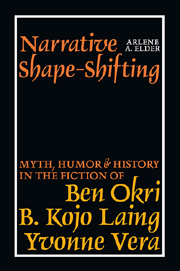 Narrative Shape-Shifting
Narrative Shape-Shifting 1 - Ben Okri's Narrative Cycle Shape-shifting on the Page
Published online by Cambridge University Press: 05 April 2013
Summary
‘I think Ben Okri is a writer who works very hard to sing from all the things that affect him. I don't know if he's an African writer, a British writer. I never think of myself in terms of any classification.’ (Okri to Emeagwali, 1997)
The Artist & Nigeria's Identity Construction
Ben Okri's self-analysis quoted above may raise the hackles of nationalists and identity politicians; it also may dismay the small band of scholars who had hoped to have settled the huge problem of defining ‘African literature’ by the end of the twentieth century. It may even lead the more cynical among us to smile knowingly when we consider the expatriate Okri's lengthy residence in England. One response it surely should evoke is gratitude for his reinforcing our perception of his personal and artistic hybridity as an extremely useful key to his abiku trilogy. The Famished Road (1991), for which he won the prestigious Booker Prize, his Songs of Enchantment (1993), and Infinite Riches (1998) comprise a cyclic narrative that historicises the political situation in Nigeria on the verge of independence from Britain and predicts its turbulent future. More ambitiously, these novels seek to remind the reader of universal moral and political values that the novelist believes the West once shared with traditional African cultures and that, in his judgment, remain essential for human welfare.
- Type
- Chapter
- Information
- Narrative Shape-ShiftingMyth, Humor and History in the Fiction of Ben Okri, B. Kojo Laing and Yvonne Vera, pp. 7 - 55Publisher: Boydell & BrewerPrint publication year: 2009


